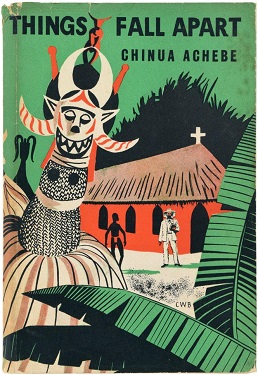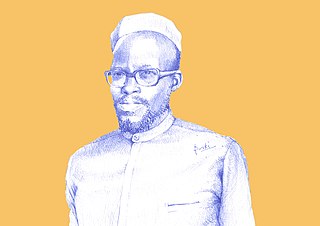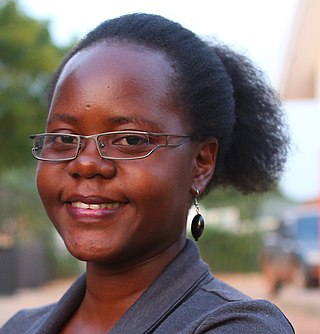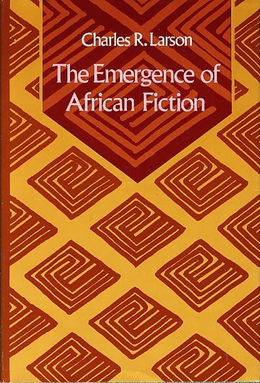Related Research Articles

Akinwande Oluwole Babatunde Soyinka Hon. FRSL, known as Wole Soyinka, is a Nigerian playwright, novelist, poet, and essayist in the English language. He was awarded the 1986 Nobel Prize in Literature for "in a wide cultural perspective and with poetic overtones fashioning the drama of existence", the first sub-Saharan African to be honoured in that category.

Chinua Achebe was a Nigerian novelist, poet, and critic who is regarded as a central figure of modern African literature. His first novel and magnum opus, Things Fall Apart (1958), occupies a pivotal place in African literature and remains the most widely studied, translated, and read African novel. Along with Things Fall Apart, his No Longer at Ease (1960) and Arrow of God (1964) complete the "African Trilogy". Later novels include A Man of the People (1966) and Anthills of the Savannah (1987). In the West, Achebe is often referred to as the "father of African literature", although he vigorously rejected the characterization.

Things Fall Apart is the debut novel of Nigerian author Chinua Achebe, first published in 1958. It depicts pre-colonial life in Igboland and the subsequent appearance of European missionaries and colonial forces in the late 19th century. It is seen as the archetypal modern African novel in English, and one of the first to receive global critical acclaim. It is a staple book in schools throughout Africa and is widely read and studied in English-speaking countries around the world. The novel was first published in the United Kingdom in 1958 by William Heinemann Ltd, and became the first work published in Heinemann's African Writers Series.

Nigerian literature may be roughly defined as the literary writing by citizens of the nation of Nigeria for Nigerian readers, addressing Nigerian issues. This encompasses writers in a number of languages, including not only English but Igbo, Urhobo, Yoruba, and in the northern part of the county Hausa and Nupe. More broadly, it includes British Nigerians, Nigerian Americans and other members of the African diaspora.
In June 1962 a conference of African literature in the English language, the first African Writers Conference, was held at Makerere University College in Kampala, Uganda. Officially called a "Conference of African Writers of English Expression", it was sponsored by the Congress for Cultural Freedom and the Mbari Club in association with the Department of Extra-Mural Studies of Makerere, whose director was Gerald Moore.

Ayi Kwei Armah is a Ghanaian writer best known for his novels including The Beautyful Ones Are Not Yet Born (1968), Two Thousand Seasons (1973) and The Healers (1978). He is also an essayist, as well as having written poetry, short stories, and books for children.
The African Writers Series (AWS) is a collection of books written by African novelists, poets and politicians. Published by Heinemann, 359 books appeared in the series between 1962 and 2003.
African literature is literature from Africa, either oral ("orature") or written in African and Afro-Asiatic languages. Examples of pre-colonial African literature can be traced back to at least the fourth century AD. The best-known is the Kebra Negast, or "Book of Kings."
The Strong Breed is one of the best-known plays by Wole Soyinka. It is a tragedy that ends with an individual sacrifice for the sake of a community's benefit. The play is centered on the tradition of egungun, a Yoruba festival tradition in which a scapegoat of the village carries out the evil of the community and is exiled from the civilization.
Simon E. Gikandi is a Kenyan Literature Professor and Postcolonial scholar. He is the Class of 1943 University Professor of English at Princeton University. He is perhaps best known for his co-editorship of The Cambridge History of African and Caribbean Literature. He has also done important work on the modern African novel, and two distinguished African novelists: Chinua Achebe and Ngũgĩ wa Thiong'o. In 2019 he became the president of the Modern Language Association.

Elleke Boehmer, FRSL, FRHistS is Professor of World Literature in English at the University of Oxford, and a Professorial Governing Body Fellow at Wolfson College. She is an acclaimed novelist and a founding figure in the field of Postcolonial Studies, internationally recognised for her research in colonial and postcolonial literature and theory. Her main areas of interest include the literature of empire and resistance to empire; sub-Saharan African and South Asian literatures; modernism; migration and diaspora; feminism, masculinity, and identity; nationalism; terrorism; J. M. Coetzee, Katherine Mansfield, and Nelson Mandela; and life writing.
Chin Ce is a Nigerian writer of poetry, fiction and essays and a graphic editor.
Steve Bernard Miles Chimombo was a Malawian writer, poet, editor and teacher. He was born in Zomba.

James Currey is an academic publisher specialising in African Studies which since 2008 has been an imprint of Boydell & Brewer. It is named after its founder who established the company in 1984. It publishes on a full spectrum of topics—including anthropology, archaeology, history, politics, economics, development studies, gender studies, literature, theatre, film studies, and the humanities and social sciences generally—and its authors include leading names such as Bethwell Ogot and Ngũgĩ wa Thiong'o.

Pio Zirimu was a Ugandan linguist, scholar and literary theorist. He is credited with coining the word "orature" as an alternative to the self-contradictory term, "oral literature" used to refer to the non-written expressive African traditions. Zirimu was also central in reforming the literature syllabus at Makerere University to focus on African literature and culture instead of the English canon.

Ber Anena born and previously published as Harriet Anena is a Ugandan writer and performer, whose writing includes poetry, nonfiction and fiction. She is the author of a collection of poems, A Nation In Labour, published in 2015, won the 2018 Wole Soyinka Prize for Literature in Africa. The Economist described her poetry performance as "an arresting evocation of love and war".
The Mbari Club was a centre for cultural activity by African writers, artists and musicians that was founded in Ibadan, Nigeria, in 1961 by Ulli Beier, with the involvement of a group of young writers including Wole Soyinka and Chinua Achebe. Mbari, an Igbo concept related to "creation", was suggested as the name by Achebe. Among other Mbari members were Christopher Okigbo, J. P. Clark and South African writer Ezekiel Mphahlele, Frances Ademola, Demas Nwoko, Mabel Segun, Uche Okeke, Arthur Nortje and Bruce Onobrakpeya.

Wanda Leopold was a Polish author, medical doctor, and social science activist known for her study of English writings beginning in West Africa, specifically Nigeria. A translator as well as a literary critic, she stressed the artistic qualities of creative writing. She was a scholar of Polish culture, literature, and language. Her book, "O literaturze Czarnej Afryki," was the first Polish introduction to African literature that was written in both English, and French. Some of her first critical essays were on Chinua Achebe, Cyprian Ekwensi, and Wole Soyinka.

The Emergence of African Fiction is a 1972 academic monograph by American scholar Charles R. Larson. It was published initially by Indiana University Press, and again, in a slightly revised edition, in 1978 by Macmillan. Larson's study has elicited very different responses: it was praised as an early and important book in the study and appreciation of African literature in the West, but for others it remained stuck in a Eurocentric, even colonizing mode in which Western aesthetics were still the unspoken standard for artistic assessment.

Ossie Enekwe, born Onuora Osmond Enekwechi, was a Nigerian dramatist, poet, novelist, and professor of Theatre Arts. A former vice president of the Association of Nigerian Authors (ANA) as well as the former director of the Institute of African Studies at the University of Nigeria, Nsukka (1998–2004). He helped to establish the University of Nigeria's Dramatic Arts Department. Enekwe was the editor of Okike: The African Journal of New Writing from 1984 to 2010, after being appointed by its founder, Chinua Achebe, who founded it in 1971. When Ossie Enekwe retired in 2010, he handed over the editorship of Okike to Amechi Akwanya.
References
- ↑ Oduor Oduku, Richard (8 January 2018). "An African in London and Other Reflections on African Literatures". Brittle Paper . Retrieved 26 September 2023.
- ↑ "Contributors | Mpalive-Hangson Msiska", Africa Writes, 2018.
- ↑ "Staff in the School of Creative Arts, Culture and Communication | Emeritus Staff". Birkbeck University of London. Retrieved 26 September 2023.
- ↑ "About | Advisory Council". Caine Prize. Retrieved 26 September 2023.
- ↑ Msiska, Mpalive-Hangson (2007). Postcolonial Identity in Wole Soyinka. Cross/Cultures. Vol. 93.
- ↑ "Review of African Literatures and Beyond". Leeds African Studies Bulletin. University of Leeds Centre for African Studies (LUCAS). 2014–15. Retrieved 26 September 2023.
- ↑ "2003 | Judges". Dublin Literary Award. 2003. Retrieved 26 September 2023.
- ↑ "2018 | Judges". Dublin Literary Award. 2018. Retrieved 26 September 2023.
- ↑ Pauli, Michelle (11 July 2006). "Mary Watson wins 'African Booker'". The Guardian .
- ↑ "Warsan Shire announced as first ever winner of Brunel University African Poetry Prize". Brunel University London. 30 April 2013. Retrieved 26 September 2023.
- ↑ Msiska, Mpalive-Hangson, "Sexual Politics in Malawian Popular Fiction: The Case of Aubrey Kalitera's Why Father Why", Kunapipi, 11(3), 1989.
- ↑ Msiska, Mpalive, "What is Black-British Writing?", African Writing Online, October/November 2007.
- ↑ Msiska, Mpalive-Hangson (2014), "Imagined nations and imaginary Nigeria: Chinua Achebe’s quest for a country", Journal of Genocide Research, 16:2–3, 401–419.
- ↑ Mpalive-Hangson, Msiska (2016). "The novel and decolonization in Africa". In Gikandi, S. (ed.). The Novel in Africa and the Caribbean since 1950. The Oxford History of the Novel in English 16. London, UK and New York, U.S.: Oxford University Press. pp. 37–55. ISBN 9780199765096.
- ↑ Msiska, Mpalive-Hangson (2017), "Kujoni: South Africa in Malawi's National Imaginary", Journal of Southern African Studies, 43:5, 1011–1029, DOI: 10.1080/03057070.2017.1360634.
- ↑ Msiska, Mpalive-Hangson (2017), "Rethinking the future of Humanities in Africa and the question of epistemological agency", Journal of Humanities, University of Malawi, 25 (1), pp. 5–30. ISSN 1016-0728.
- ↑ Msiska, Mpalive-Hangson (2018), "Colonialism, trauma and affect: Chinua Achebe's Arrow of God as Oduche's Return". Research in African Literatures 49 (4), pp. 46–66. ISSN 0034-5210.